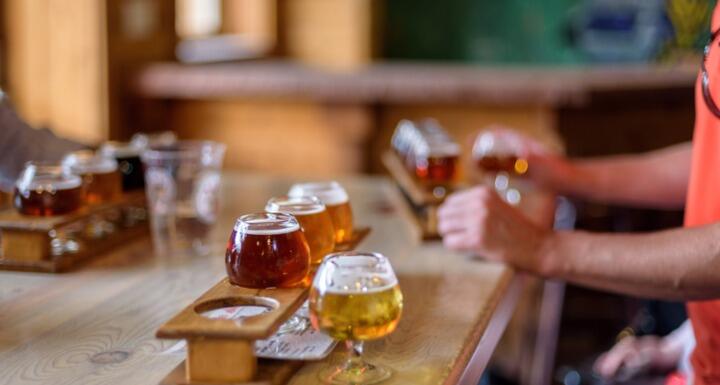In addition to all its natural beauty and opportunities for outdoor recreation, Western North Carolina has more lately become known for its abundance of excellent craft breweries.
For our residents and visitors who enjoy good beer, heading to a local brewery after a day of hiking, biking, or floating the river is standard. Craft breweries have become part of the landscape and lifestyle, and many of us have special affinities for our favorite ones. We're friends with the staff, we sport their t-shirts and hats, and we delight in all the whimsical names they use to distinguish their beers.
On that last note, what about all those whimsical names? It seems like there was a time (perhaps before many readers were of legal drinking age) when a brewery's name and logo, and some indication of the beer style, were sufficient to sell the beer. Certain beer styles were more likely to have interesting names, but they were less common than the ubiquitous (and often unnamed) pale ale and porter. In any case, there is no denying that today's craft beer landscape is different. Brewery menus bless us with a wide variety of offerings, each with its own fun or interesting name. The name may seek to give the consumer a laugh, or it may project an idea or image the consumer will otherwise find appealing. Accordingly, craft beer enthusiasts have come to expect a certain amount of entertainment and whimsy at their local brewery, in addition to the great beer.
So, with the explosion of craft breweries over the last decade, in North Carolina and beyond, have you ever wondered how a brewer's rights in those names are protected and enforced? The answer is trademark law.
Trademarks Generally
Trademarks may consist of words, phrases, symbols, designs, or any combination of those things, identifying and distinguishing the source of the goods or services of one seller from the goods or services of another. Trademarks can include all of the elements that constitute a "brand." Technically, the term "trademark" is the precise term for a mark used for goods (such as beer), while "service mark" is precise for a mark used for services. The term "trade name" is used for a mark describing the company selling the goods or services. Trademarks, service marks, and trade names are very similar, and the terms are often used interchangeably as simply "trademarks."
That can or bottle of your favorite brew may bear any number of distinct trademarks. They include the names of the specific beer and brewery that made it, but they may also include the taglines, logos, artwork, and other designs associated with the specific beer and brewery. Sometimes even the packaging itself may be distinctive enough to qualify for trademark protection. The distinctive shape of a Coca-Cola® bottle is one such example. This is known as "trade dress" protection.
To qualify for trademark protection, a beer name must meet certain criteria. One criterion is that the name be considered distinctive under trademark law. To be distinctive, consumers must be likely to perceive the name as distinguishing the source of the beer rather than perceive it as describing a quality or characteristic of the beer. Descriptive terms, which are not entitled to trademark protection (at least not right away) may include, for example, terms that describe the ingredients, style, flavor, or geographical origin of the beer. A brewery can sometimes acquire trademark rights in a descriptive term (most commonly geographical terms), but it requires long-term exclusive use of the term by the brewery. Even then, some terms are so descriptive as to never be protectable as trademarks. For example, the word "hoppy" is such a common and necessary descriptor of beer flavor that no single brewery could ever claim the exclusive right to its use.
How Trademark Rights are Acquired
A brewery may acquire trademark rights to a distinctive beer name in different ways. Often, the brewery that is the first to adopt a name, and thereafter continuously and exclusively use it to sell beer, will acquire so-called "common law" trademark rights to the name. Because such rights are based solely on the use of the name in commerce, the rights are geographically limited to the localities where the beer has been sold.
Another way to acquire trademark rights is through registration. Registration of a beer name can be sought at the state or federal level, depending on the scope of legal protection sought. An application for registration can be filed after the brewery has already begun use of a beer name or, if filing at the federal level, as soon as the brewery has conceived of the name and formed an intention to use it. The latter type of application (called an "intent-to-use" trademark application) is a valuable tool because it allows a brewery to temporarily reserve a name while they are planning, brewing, and doing whatever else is necessary to bring the beer to market.
Although seeking trademark registration for a beer name is not required, the principal benefits of being a trademark owner are limited without registration. In addition to being geographically limited, a brewery seeking to enforce common-law trademark rights against someone in court has the burden to establish their actual prior use of the beer name in the disputed sales territory. By contrast, the owner of a federal trademark registration is entitled to a presumption of nationwide trademark rights in the name registered. A federal trademark registration has other legal benefits as well, so it can be a very valuable asset to a brewery.
The process of trademarking a beer name is complex. It's best to contact an experienced attorney who can assist you at every step. Ward and Smith Intellectual Property attorneys are season veterans in helping businesses protect the brands and would be happy to discuss your specific needs.








